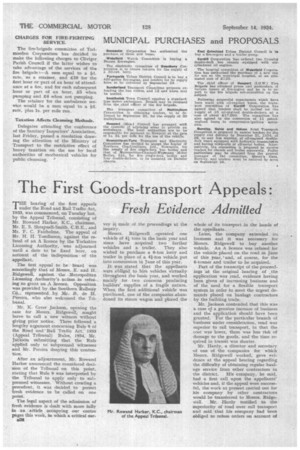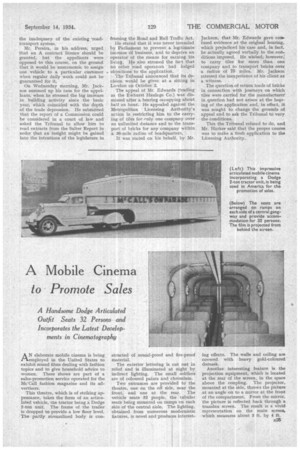The First Goods-transport Appeals:
Page 34

Page 35

If you've noticed an error in this article please click here to report it so we can fix it.
Fresh Evidence Admitted
THE hearing of the first appeals under the Road and Rail Traffic Act, 1933, was commenced, on Tuesday last, by the Appeal Tribunal, consisting of Mr. Rowand Harker, RC., chairman, Mr. E. S. Shrapnell-Smith, C.B.E., and Mr. F. C. Fairholme. The appeal of Mr. H. H. Tomlinson, against the refusal of an A licence by the Yorkshire Licensing Authority, was adjourned until a date to be fixed later, on• account of the indisposition of the appellant.
The first appeal to be heard -ivas accordingly that of Messrs. E. .and H. Ridgewell, against the Metropolitan Licensing Authority's action in refusing to grant an A licence. Opposition was provided by the Southern Railway represented by Mr. B. de H. Pereira, who also welcomed the Tribunal.
Mr. K. Greer Jackson, opening the case for Messrs. Ridgewell, sought leave to call a new witness without giving prior notice. There followed a lengthy argument concerning Rule -9 of the Road and 'Rail Traffic Act, 1933 Appeal 'Tribunal) Rules; 1934, Mr. JaCkscin submitting that the Rule applied only to subpoenaed witnesses and Mr. Pereira denying this contention.
After an adjournment, Mr. Rowand Harker announced the considered decision of the Tribunal on this point, stating that Rule 9 was interpreted by the Tribunal to apply only to subpcenaed witnesses. Without creating a precedent, it was decided to permit fresh evidence to be called on one
The legal aspect of the admission of fresh evidence is -dealt with more fully in an article occupying our centre pages this week, in which a critical sur
est vey is made of the proceedings at the inquiry.
Messrs. Ridgewell operated one vehicle of di tons in the basic year and since have acquired two further vehicles and a trailer. They also wished to purchase a 6-ton lorry and trailer in place of a 4i-ton vehicle put into commission in June of this year.
It was stated that the appellants were obliged to hire vehicles virtually throughout the basic year, and worked mainlY for two concerns producing builders' supplies of a fragile nature. When, the first additional vehicle was purchased, one of the companies abandoned its steam wagon and placed the whole of its transport in the hands of the appellants.. , • • • Later, the company extended its business and it was necessary for Messrs. Ridgewell to buy another vehicle. An A licence was refused for the vehicle placed on. the road in June of this year, • and, of course, for the 6-tonner and trailer to be acquired.
Part of the transcript of-the proceedings at the original hearing of ,the application was read, evidence having been given of increasing business and of the need for a flexible transport system in order -to meet the urgent demands placed on haulage contractors by the building trade.
Mr. Jackson contended that this was a case of a genuine increase of business and the application should have been granted. For the particular branch of business under consideration, road was superior to rail transport, in that the cost was lower, there was less risk of damage to the goods, and the time required in transit was shorter.
Mr. Hardy, a director and secretary of one of the companies for which Messrs. Ridgewell worked, gave evidence at the appeal hearing regarding the difficulty of obtaining regular haulage service from other contractors in the district. His company, he said, had a first call upon the appellants' vehicles and, if the appeal were successful, the work at present carried out for his company by other contractors would be transferred to Messrs. Ridges well. Mr. Hardy testified to the superiority Of road over rail transport and said that his company had been obliged to refuse orders on account of
the inadequacy of the existing -roadtransport system.
Mr. Pereira, in his address, urged that an A contract licence should be granted, but the appellants were opposed to this course, on the ground that it would be uneconomic to assign one vehicle to a particular customer when regular daily work could not be guaranteed for it.
On Wednesday morning, Mr. Jackson summed up his case for the appellants, when he stressed the big increase in building activity since the basic year, which coincided with the depth of the trade depression. He submitted that the report of a Commission could be considered in a court of law and asked the Tribunal to allow him to read extracts from the Salter Report in order that an insight might be gained into the intentions of the legislature in framing the Road and Rail Traffic Act.
He stated that it was never intended by Parliament to prevent a legitimate increase of business, and to deprive an operator of the means for earning his living. He also stressed the fact that no other road operators had lodged objections to the application.
The Tribunal announced that its decision would be given it a sitting in London on October 2.
The appeal of Mr. Edwards (trading as the Ewhurst Haulage Co.) was dismissed after a hearing occupying about half an hour. He appealed against the Metropolitan Licensing Authority's action in restricting him to the carrying of tiles for enly one company over an unlimited distance and to the transport of bricks for any company within a 30-mile radius of headquarters, It was stated on his behalf, by Mr. Jackson, that Mr. Edwards gave confused evidence at the original hearing, which prejudiced his case and, in fact, he actually agreed verbally to the con, ditions imposed. He wished, howeveri to carry tiles for more than one company and to transport bricks over a radius of 75 miles. Mr. Jackson stressed the inexperience of his client aS a witness.
The question, of return loads of bricks in connection with journeys on which tiles were carried for the manufacturer' in question had not arisen. at the hearing of the application and, in effect, it was sought to change the grounds of appeal and to ask the Tribunal to vary the conditions.
This the Tribunal refused to do, and Mr. Harker said that the proper course was to make a fresh application to the Licensing Authority.




















































































